Mental Focus

What role does physical exercise play in boosting mental focus ?
Physical exercise is not only beneficial for our physical health, but it also plays a crucial role in enhancing mental focus. Here's how: 1. Release of Endorphins: Regular exercise triggers the release of endorphins, which can help reduce stress and anxiety, leading to improved mental clarity and focus. 2. Increased Blood Flow to the Brain: Engaging in physical activities increases blood flow to the brain, delivering more oxygen and nutrients. This increased blood flow can help improve cognitive function, memory, and overall mental sharpness. 3. Better Sleep Quality: Exercise has been shown to promote better sleep quality and duration. Adequate sleep is essential for maintaining mental focus and concentration throughout the day. 4. Reduction of Stress and Anxiety: Physical activity helps lower levels of the body's stress hormones, such as cortisol. By reducing stress and anxiety, exercise allows individuals to maintain a clearer mind and stay focused on tasks at hand. 5. Enhanced Self-Confidence and Mood: Regular exercise can boost self-esteem and confidence, leading to a positive outlook on life. A positive mindset contributes to better mental focus and productivity. 6. Improved Cognitive Function: Studies have found that regular physical exercise can lead to improvements in various aspects of cognitive function, including attention, memory, and executive functions. These cognitive enhancements directly contribute to increased mental focus and concentration.
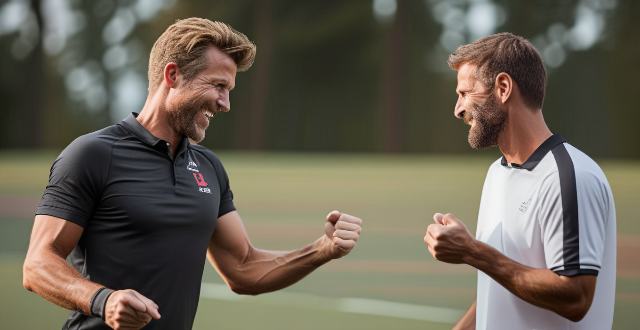
How does mental toughness impact athletic performance at a competitive level ?
In summary, this article explores the impact of mental toughness on athletic performance at a competitive level. It highlights the benefits of mental toughness, including enhanced focus and concentration, improved resilience and coping mechanisms, increased confidence and self-belief, and better decision making under pressure. The article also provides practical tips for developing these essential skills through mindfulness techniques, visualization, positive self-talk, scenario training, and continuous self-improvement. Overall, mental toughness is crucial for athletes to perform at their best and achieve success in their chosen sport.

Are there specific breathing exercises that aid in maintaining focus ?
There are several breathing exercises that can aid in maintaining focus, including diaphragmatic breathing, alternate nostril breathing (Nadi Shodhana), box breathing, and roll breathing. These techniques calm the mind, reduce stress, and increase oxygen flow to the brain, enhancing cognitive function and mental clarity. Incorporating these exercises into your daily routine can help improve your ability to maintain focus and concentration.
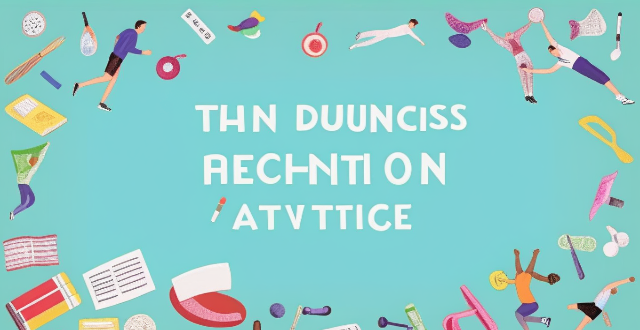
What techniques can help me improve my focus and concentration during sports activities ?
This text discusses various techniques that can help improve focus and concentration during sports activities. These techniques include mindfulness meditation, visualization techniques, goal setting, positive self-talk, and proper nutrition and hydration. The text explains how each technique can be practiced and its benefits in improving performance in sports. By incorporating these techniques into daily routine, athletes can enhance their focus and concentration, leading to better performance and enjoyment of their chosen sport.

How can mindfulness practices be integrated into sports psychology for improved focus and performance ?
Mindfulness practices can be integrated into sports psychology to improve focus and performance for athletes. Benefits include improved concentration, reduced anxiety and stress, enhanced self-awareness, and better recovery. Techniques such as breathing exercises, meditation, visualization, mindful movement, and journaling can be used by athletes to develop greater awareness of their thoughts, feelings, and surroundings. Incorporating these practices into training programs can help athletes stay calm under pressure, maintain focus during competitions, and improve overall performance.

Are there any apps or tools designed to improve focus and productivity ?
In today's fast-paced world, staying focused and productive is crucial for success. With the plethora of distractions around us, it's essential to have tools that can help us stay on track. In this article, we will discuss some apps and tools designed to improve focus and productivity.

How can mental toughness be developed in athletes through sports psychology ?
The article discusses the importance of mental toughness in sports and how sports psychology can help athletes develop this quality. It outlines six ways that sports psychologists can assist athletes in developing mental toughness, including goal setting, self-talk, visualization techniques, stress management, mindfulness practices, and team building activities. These strategies can enhance resilience, focus, and motivation in athletes, leading to success in their chosen sport.

What is the importance of mental health in overall personal well-being ?
The text discusses the importance of mental health in overall personal well-being. It explains how good mental health can lead to better physical health, emotional stability, healthy social relationships, workplace productivity, and an improved quality of life. The article emphasizes the need for prioritizing mental health by seeking professional help when needed, practicing self-care, and engaging in activities that promote good mental health.

How can mental training improve physical abilities in athletes ?
Mental training is crucial for athletes as it enhances physical abilities by improving focus, managing stress, and promoting a positive mindset. Techniques such as visualization, self-talk, and emotional intelligence contribute to better performance.

What are some effective techniques for improving concentration and focus ?
Concentration and focus are crucial skills for achieving goals, whether it's studying, working, or enjoying a hobby. Here are some effective techniques to improve them: minimize distractions by turning off notifications and finding a quiet place; take short breaks every hour or use the Pomodoro technique; practice mindfulness through meditation and deep breathing; set clear goals and prioritize tasks; eliminate multitasking and focus on one task at a time; get enough sleep and create a relaxing bedtime routine; exercise regularly to enhance cognitive function; stay hydrated to avoid fatigue; use visual cues like charts and diagrams; and limit caffeine intake to avoid jittery feelings.

Are there specific exercises that help improve mental health ?
Exercises like yoga, meditation, aerobic exercise, resistance training, MBSR, and Tai Chi can help improve mental health by reducing stress, anxiety, and depression symptoms while promoting relaxation, self-awareness, and social interaction.

How does yoga combine physical activity with mental relaxation ?
Yoga integrates physical activity and mental relaxation through various practices like asanas, pranayama, dhyana, and dharana. Asanas improve flexibility, strength, and endurance, while vinyasa increases heart rate for cardiovascular exercise. Pranayama techniques enhance lung capacity and stamina. Meditation calms the mind, and concentration practices sharpen focus. Yogic philosophy promotes emotional stability. Mindful movement connects physical practice with mental awareness, synchronized breath reduces strain, and restorative poses allow for deep relaxation. Overall, yoga offers a holistic approach to wellness by harmoniously blending body and mind.

How do sports competitions influence stress levels and mental readiness ?
Sports competitions can significantly impact stress levels and mental readiness. Performance pressure, fear of failure, winning obsession, and physical exertion can increase stress levels, while confidence building, goal achievement, camaraderie, and mindfulness practices can decrease them. Similarly, focus and concentration, resilience, mental toughness, and visualization techniques can improve mental readiness, while overthinking, perfectionism, lack of self-belief, and external factors can impair it. Overall, sports competitions provide opportunities for growth, learning, and personal development but also present challenges that require effective coping strategies to manage stress levels and maintain mental readiness.

In what ways does mental health support impact overall women's health ?
This text discusses the importance of mental health support for women's overall health, highlighting its impact on physical health, emotional well-being, relationships, and work performance. It emphasizes that good mental health can reduce the risk of chronic diseases, improve sleep quality, and help manage pain. Additionally, it mentions how mental health support can enhance emotional well-being by reducing stress, improving mood, and increasing resilience. The text also points out that mental health support can strengthen relationships through improved communication, better emotional regulation, and greater empathy. Lastly, it notes that mental health support can enhance work performance by improving focus, reducing absenteeism, and increasing job satisfaction.

Can physical activity improve mental health ?
Physical activity has been found to significantly improve mental health by enhancing self-efficacy and stress self-management skills. Research shows that engaging in physical activities can lead to a sense of accomplishment, boosting an individual's confidence in their abilities, which in turn fosters better stress management and contributes to enhanced mental well-being. This relationship is particularly important for adolescents, a demographic vulnerable to mental health challenges. Future research should focus on identifying specific types of physical activities that have a greater potential to enhance these skills, guiding the development of targeted interventions aimed at improving mental health through physical activity.

What are the best exercises for improving mental health ?
Engaging in regular physical activities is crucial for maintaining good mental health. Some of the best exercises for improving mental health include cardiovascular exercises like running, cycling, and swimming; strength training exercises like weightlifting, resistance bands, and bodyweight exercises; and yoga and meditation practices like Hatha yoga, mindfulness meditation, and Tai Chi. By incorporating these exercises into your routine, you can reduce stress and anxiety levels while also improving overall well-being.

What role does discipline in sports play in achieving personal goals and mental resilience ?
The text discusses the importance of discipline in sports for achieving personal goals and building mental resilience. It outlines key aspects such as setting clear objectives, consistent practice, overcoming obstacles, self-regulation, focus and concentration, and resilience under pressure. The article emphasizes that discipline not only enhances physical performance but also strengthens mental fortitude, enabling athletes to reach their full potential and thrive in their respective sports.
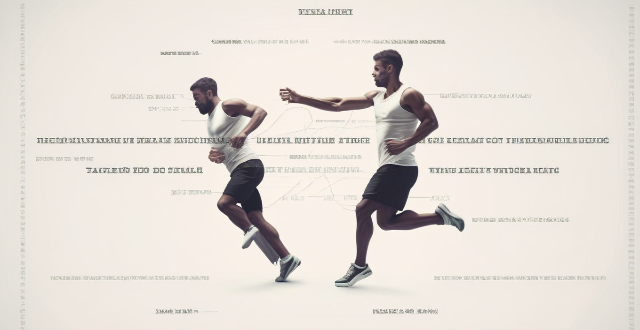
What role does mental training play in improving sports skills ?
The text discusses the role of mental training in enhancing sports skills. It outlines key points including mental toughness, visualization techniques, goal setting, self-talk, and concentration skills. Mental toughness helps athletes handle pressure, recover from setbacks, and persist through challenges. Visualization techniques can program the subconscious, reduce anxiety, and increase motivation. Goal setting clarifies objectives, tracks progress, and maintains motivation. Positive self-talk boosts confidence, enhances performance, and regulates emotions. Concentration skills block distractions, maintain attention, and improve decision making. The conclusion states that mental training is an essential component of overall athletic success.
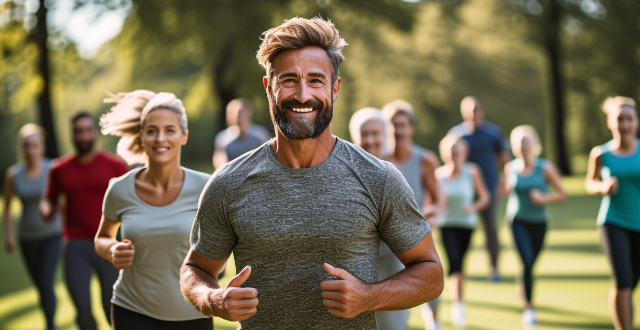
Is there a difference in mental health benefits between individual and group exercises ?
Exercise plays a vital role in maintaining good mental health, with both individual and group exercises offering unique benefits. Individual exercises provide flexibility, focus, and personal challenge, while group exercises offer social support, motivation, and accountability. Both types of exercise have been shown to reduce stress, anxiety, and depression while improving mood, self-esteem, and cognitive function. Ultimately, finding an activity that you enjoy and can consistently incorporate into your lifestyle is key to maintaining good mental health through exercise.

How important is mental health in managing a sports career ?
This article discusses the importance of mental health in managing a sports career. It explains how mental health affects an athlete's performance, recovery, team dynamics, off-field success, and personal growth. The article emphasizes that athletes with good mental health are more likely to set goals, work hard towards achieving them, and push through challenges. It also highlights the role of mental health in developing life skills that extend beyond an athlete's sports career. Overall, the article underscores the significance of prioritizing mental well-being for athletes to maximize their potential both as individuals and members of their teams.

In what ways can sports education improve mental health and well-being ?
Sports education plays a crucial role in enhancing mental health and overall well-being by offering numerous benefits that contribute to the development of a healthy mind and body. It helps reduce stress, improve self-esteem, promote better sleep, provide opportunities for social interaction, teach goal setting, time management, resilience and perseverance, and develop mindfulness and focus. By promoting physical activity, social interaction, goal setting, time management, resilience, and mindfulness, sports education can help individuals develop the skills they need to lead healthy, fulfilling lives.

How does exercise contribute to mental rejuvenation ?
Exercise plays a crucial role in mental rejuvenation by releasing endorphins, improving blood flow, enhancing neuroplasticity, reducing stress, improving sleep quality, facilitating social interaction, and boosting self-esteem. Regular physical activity can significantly contribute to improved cognitive functions, emotional stability, and overall mental well-being.

What is the relationship between exercise and mental health ?
Exercise has a profound impact on mental health, enhancingExercise has a profound impact on mental health, enhancing reducing stress, improving sleep quality enhancing mood and cognitive function, reducing stress, improving sleep quality, and fostering social interaction. Regular physical activity stimulates the release of neurotransmitters like endorphins, serotonin, and dopamine, leading to improved mood, relaxation, and better cognitive abilities. It also helps manage cortisol levels, promotes deeper sleep, and provides emotional support through group activities, ultimately contributing to overall mental well-being.

What is the importance of mental health in global health initiatives ?
This document discusses the importance of mental health in global health initiatives. It explains why mental health matters and how it affects physical health, economic stability, and social outcomes. The document also discusses how mental health affects global health initiatives and emphasizes the need for culturally sensitive approaches to address mental health issues sustainably.

How does participating in extreme sports affect mental toughness and risk-taking behavior ?
Extreme sports can positively affect mental toughness and risk-taking behavior, helping individuals build resilience and manage risks effectively. However, it is crucial to prioritize safety and recognize personal limitations.

How can we address the stigma surrounding mental health in women ?
Summary: Addressing the stigma surrounding mental health in women requires a comprehensive approach involving education, awareness, and advocacy. Public education campaigns can help demystify mental health, while school programs can teach young girls that it's okay to seek help. Corporate training and media representation can also play a role in changing public perception. Support groups, mental health advocates, government policies, and employer policies can provide support and resources for women struggling with mental health issues. By working together, we can create a society where women feel comfortable discussing their mental health and seeking help without fear of judgment or discrimination.

In what ways do physical activities promote mental health and deter video game dependency ?
This topic summary delves into the intricate relationship between physical activities, mental health, and video game dependency. It emphasizes the role of physical activities in promoting mental well-being by boosting mood, enhancing cognitive functions, and providing social interaction. Conversely, it highlights how these activities can deter video game dependency by offering alternative forms of entertainment, setting boundaries for gaming time, and fulfilling achievement needs. The text underscores the importance of maintaining a balance between digital leisure and physical activities for overall mental health and well-being.
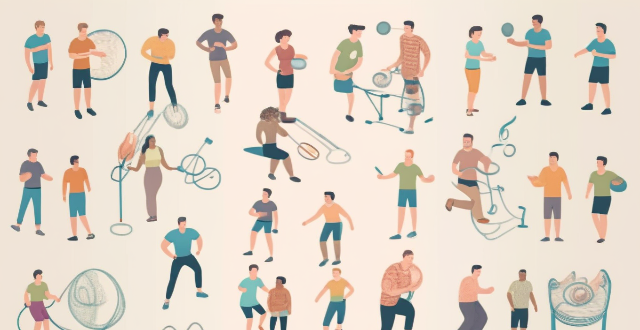
How do athletes cope with the mental stress of competition ?
Athletes employ various strategies to cope with mental stress during competitions, including visualization and imagery, breathing techniques, goal setting, social support, mindfulness and meditation, professional help, and maintaining healthy lifestyle habits. These methods range from mental preparation techniques to seeking professional guidance and engaging in leisure activities for relaxation and enjoyment. By incorporating these strategies into their routines, athletes are better equipped to handle the psychological demands of competition.

What role does religion play in athletes' mental preparation for competitions ?
The role of religion in athletes' mental preparation for competitions is significant as it provides motivation, coping mechanisms, resilience, team cohesion, moral guidance, and spiritual fulfillment. Religion can serve as a source of inspiration and help athletes manage stress and anxiety. It also enhances their mental toughness and fosters unity among teammates. Moreover, religion guides athletes in making ethical decisions and offers spiritual fulfillment, contributing to their overall well-being. However, the impact of religion on athletic performance varies depending on individual beliefs and experiences.

Is high-intensity interval training (HIIT) more effective for mental health than steady-state cardio ?
This article explores whether high-intensity interval training (HIIT) is more effective for mental health than steady-state cardio. HIIT involves short bursts of intense activity followed by periods of rest or low-intensity activity, while steady-state cardio involves maintaining a consistent level of activity for an extended period. Both types of exercise offer benefits for mental health, such as improved mood, reduced anxiety and stress, increased self-efficacy, relaxation, and social opportunities. However, they may appeal to different individuals based on their preferences and goals. Incorporating both types of exercise into a regular routine can provide the most comprehensive benefits for mental health.